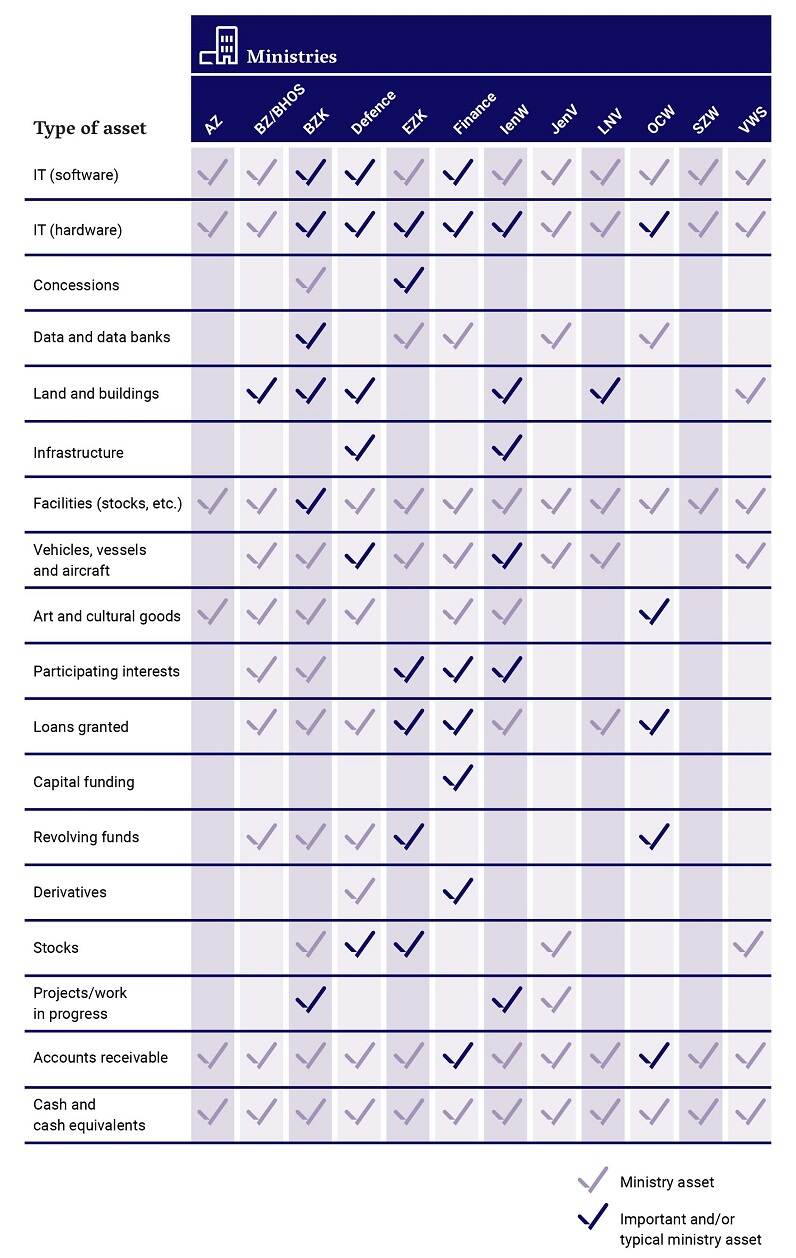No inventory of state-owned assets: inventory by Court of Audit needed
Inventory necessary for parliamentary decision-making and control
The Dutch central government does not have a full inventory of its assets or know what their current value is. An inventory of the assets and associated management, maintenance and replacement budgets should be the most normal thing in the world. But an audit by the Netherlands Court of Audit has found otherwise.
State-owned assets range from real estate to cultural heritage, from roads and bridges to stocks of medicinal cannabis, vaccines, oil and gas and from defence materiel to ICT systems. All these assets were originally purchased with public money.

Ministerial balance sheets not mandatory
Unlike other public and private organisations such as hospitals, municipalities and companies, ministries are not required by law to prepare balance sheets and disclose the current value of their assets. The Court of Audit recommends that they should. State-owned assets, after all, are worth hundreds of millions of euros.
An inventory is important not only for accountability purposes but also to see whether a minister has budgeted sufficient funds for maintenance and management. Budgets that have been formed for locks and bridges, ICT systems and Ministry of Defence bases are currently insufficient. If it is not known precisely what the state owns, how much it is worth and how much it depreciates in value, it cannot be known how much should be budgeted for maintenance and replacement. As a first step towards such an inventory, the Court of Audit has investigated what assets each ministry owns.
‘Focus on ministries with major investments’
In his response to our audit report, the Minister of Finance stated that he recognised the importance of the maintenance and upkeep of state-owned assets but in his opinion keeping tally of all state-owned assets and valuing them would be a huge undertaking. The minister will therefore concentrate on the ministries with the largest investment budgets. That, he thought, would generate the greatest added value. In the Court of Audit’s opinion the government deserves a compliment for wanting to make a start at those ministries, but it should not stop there. The minister’s response does not take account of important assets in other parts of central government. All ministries, for instance, have ICT systems and software, which are playing an ever greater role in the delivery of public services. Problems can arise if they – like conventional infrastructure – are not replaced or upgraded on time. Furthermore, the minister’s approach is not conducive to uniformity in the government’s accounting and reporting system. In the Court of Audit’s opinion, it is problematic that the government imposes accounting and reporting rules on others but not on itself. With the exception of ministries, all organisations in the Netherlands of any significance – both private and public – are legally required to account for their assets in a balance sheet. Governments in by far the majority of countries in the European Union and the OECD are required to prepare balance sheets.
From palaces to apps
State-owned assets include all types of real estate with low to high financial value. They include office buildings used by the ministries and the Tax and Customs Administration, palaces, embassies in Germany, the United Kingdom and elsewhere. Physical infrastructure such as roads, waterways, bridges and locks, the 6 associated traffic management centres and 24 lighthouses are also state-owned assets. State-owned assets also include works of art, heritage collections, the National Archives, petrol station concessions along motorways, CO2 emission allowances and licences granted to use radio frequencies. The state owns laboratories, weapons systems, vehicles and ships, aircraft, tenant farms, nature reserves, a pipeline network, a submarine optical fibre cable, many IT systems and software applications (the Tax and Customs Administration alone has more than 900). The state also owns or co-owns considerable natural resources and many enterprises. An overall summary of each ministry is presented in a report entitled Inventory of State-owned assets – The most normal thing in the world?, which the Court of Audit sent to parliament and published on 1 December 2021.
All ministries have assets
